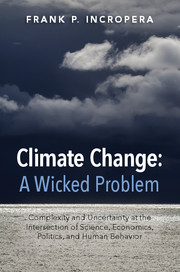 Climate Change: A Wicked Problem
Climate Change: A Wicked Problem Book contents
- Frontmatter
- Dedication
- Contents
- Foreword by Anthony F. Earley Jr.
- Foreword by G.P. “Bud” Peterson
- Foreword by Arun Majumdar
- Preface
- Acknowledgments
- Abbreviations
- 1 Energy, economics, and climate change
- 2 The Earth's climate system
- 3 Greenhouse gases
- 4 Global warming
- 5 Consequences of global warming
- 6 Mitigation, adaptation, and geoengineering
- 7 Public policy options
- 8 The politics of global warming: a history lesson and future prospects
- 9 Dissenting opinions: the great hoax
- 10 The ethics of climate change
- 11 A way forward
- Appendix A Units and conversion factors
- Appendix B Fossil fuels
- Appendix C Anthropogenic sources of natural gas and methane
- Appendix D Environmental time scales and inertia
- Appendix E Coal-fired power plants: operating conditions and costs of carbon capture and sequestration
- Notes
- References
- Index
- Plate section
10 - The ethics of climate change
Published online by Cambridge University Press: 05 October 2015
- Frontmatter
- Dedication
- Contents
- Foreword by Anthony F. Earley Jr.
- Foreword by G.P. “Bud” Peterson
- Foreword by Arun Majumdar
- Preface
- Acknowledgments
- Abbreviations
- 1 Energy, economics, and climate change
- 2 The Earth's climate system
- 3 Greenhouse gases
- 4 Global warming
- 5 Consequences of global warming
- 6 Mitigation, adaptation, and geoengineering
- 7 Public policy options
- 8 The politics of global warming: a history lesson and future prospects
- 9 Dissenting opinions: the great hoax
- 10 The ethics of climate change
- 11 A way forward
- Appendix A Units and conversion factors
- Appendix B Fossil fuels
- Appendix C Anthropogenic sources of natural gas and methane
- Appendix D Environmental time scales and inertia
- Appendix E Coal-fired power plants: operating conditions and costs of carbon capture and sequestration
- Notes
- References
- Index
- Plate section
Summary
By now, you would probably agree that the issue of climate change is wrapped in science, technology, economics, and politics. But is there yet another dimension? Many would say “yes,” maintaining the existence of a moral imperative. To address climate change from such a perspective, we'll examine some of the philosophical pillars of ethics, as well as foundations of ethical behavior derived from religious traditions. From both philosophical and theological perspectives, how do ethical considerations inform the debate on climate change?
Ethics involves reflection on human behavior and how to channel it in appropriate ways. A central question involves life and how it should be lived. Another involves the nature of good and standards by which an action is judged good or not. Such questions have been addressed by philosophers for millennia in attempts to delineate between right and wrong. But in applying these standards, difficulties often arise because many issues are multifaceted, complex, and nuanced.
Ethical dimensions of climate change
Technology has allowed humans to conquer space and time. Modern transportation systems provide movement of goods and people from one location to any other; modern communication systems enable ideas and knowledge to flow almost instantaneously across the world. Globalization has had an enormous impact on raising living standards throughout the world. But underpinning it all has been rising energy consumption, particularly from fossil fuels, and attendant environmental degradation. Some environmental damage is local, such as mining coal by mountaintop removal, or regional, such as acid rain. And most degradation is manifested over relatively short time scales, from immediate to months or years. But climate change is global and manifested over decades to millennia. Today's GHG emissions have consequences for all, anywhere on Earth, and for the unborn as well as the living. When I burn one gallon of gasoline, I discharge almost 9 kg-CO2 to the atmosphere, putting the entire planet at greater risk to the effects of climate change. When the U.S. transportation sector consumes 215 billion gallons of fuel, as it did in 2012 (Davis et al., 2014), it adds about 2 Gt-CO2 to the atmosphere, with Americans enjoying the benefits of consumption while calling upon the world to share the burdens.
- Type
- Chapter
- Information
- Climate Change: A Wicked ProblemComplexity and Uncertainty at the Intersection of Science, Economics, Politics, and Human Behavior, pp. 214 - 241Publisher: Cambridge University PressPrint publication year: 2015
